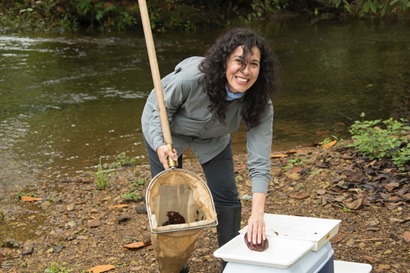Andrea C. Encalada

I´m Andrea C. Encalada, Professor of Biology and Environmental Sciences at Universidad San Francisco de Quito (Ecuador). I work on ecology of tropical and temperate streams and I´m especially interested in understanding how diversity and ecological processes change along environmental gradients. I work on several projects across the ecological hierarchy with the aim of conserving freshwater ecological integrity and the ecosystem services that they provide to societies. My current interests include developing better conceptual frameworks and decision support tools for science-based management of Andean-Amazon streams and rivers, under current scenarios of rapid climate change.
I have been a member of the Society of Freshwater Science (SFS) since 1999, when I started my PhD studies as a foreign student at Cornell University. My first SFS meeting was in Duluth, Minnesota, and since then I have participated in many excellent meetings. I consider SFS part of my academic family, because I have always felt welcomed in the society and it has contributed to my personal and professional development. However, last year, when myself and other Latin American colleagues organized the AQUATROP meeting (Tropical Freshwater Ecosystems in the Anthropocene) in Quito, Ecuador, with more than 400 participants, I was surprised to realize how poorly represented are developing countries in the SFS meetings, both in terms of researchers, but also in terms of the topics of discussion.
Although SFS has become more inclusive throughout the years, it is obvious that there is still very limited participation of people from different countries, backgrounds and ethnicities. I believe that the main reason for this lack of participation is the scarcity of funding sources in other parts of the world. From this perspective, if elected, I would like to help our Society to explore new and creative mechanisms to promote and facilitate the inclusion and participation of students and researchers from developing countries. Special sessions, merit-based travel grants, and NGO-sponsored awards are just some of the instruments that we could use to achieve this objective. Promoting a larger participation of researchers from developing countries will serve two main purposes: First, it will foster the inclusive and international character that we have been trying to give to SFS. Second, it will connect our Society with the research, and the pressing conservation issues that many of the larger basins of the world (e.g. the Amazon basin) are facing in developing countries. Higher inclusivity in our Society, will facilitate the exchange of research ideas and information that would help stablish better practices for researchers, managers and stakeholders in many less known freshwater ecosystems.

